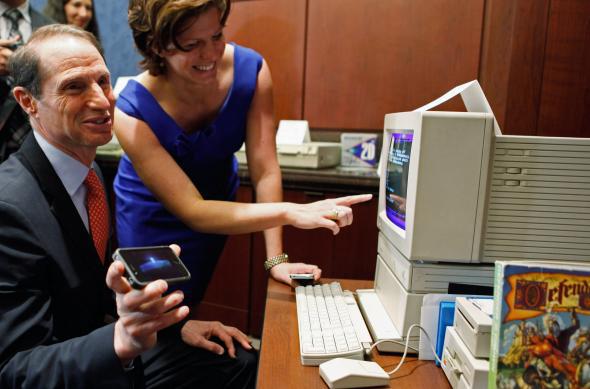If you grew up with Oregon Trail, the mere mention of the video game summons up the memory of huddling around dingy early Apple computers in libraries and classrooms. If we learned anything from those early experiences, it likely had more to do with what we discovered about the potential of computing than it did about the eponymous journey.
As it happens, bringing that game to market was a journey in its own right, much of which has now been told in a substantial Ask Me Anything on Reddit with Don Rawitsch, one of the game’s three co-inventors. Rawitsch explains that he and his fellow pioneers created the game in 1971, well before the invention of the modern personal computer. They programmed its earliest versions on a mainframe “that did all its communicating via printed text.” Years later, Rawitsch went to work for the Minnesota Educational Computing Corp., where a team converted it in 1985 to make it playable on newer machines, adding in graphics, music, and “some memorable quotes” in the process.
Though Oregon Trail would go on to sell tens of millions of copies, Rawitsch and his collaborators never got rich off the proceeds. Asked by a Reddit user whether he had ever profited from the game, Rawitsch responds that it had only ever led him “to great jobs in the ed[ucational] tech industry.” When he first arrived at MECC, “we were still 5 years away from the notion that there would be a consumer software market.” Though he doesn’t seem especially bent out of shape over his lack of good fortune, Rawitsch does observe in passing that things could have been different, quipping, “In another era, I might have owned an island by now!”
Rawitsch seems to have privileged educational innovation above all else, but the game’s current owners appear to have other goals in mind. In response to a question about mobile versions of the game, Rawitsch suggests that he’s not especially involved, allowing only that they “play more like an arcade game” and that he suspects “a historical model is not involved.” Here, another Reddit user steps in, claiming to have worked on an early version of the eventual iOS release. Though the mobile version was originally intended as a more faithful update, the user claims, it eventually turned into “a basic resource management sim that served as a platform for arcade mini-games.”
Still, those who are still nostalgic for the older versions will find plenty to intrigue and amuse in Rawitsch’s public Q&A. He offers real-life tips about surviving dysentery (“it’s all about eating well”), as well as practical advice about thriving in the game (waste too much time much time hunting and you’ll hit the Rockies during winter). And though he declines to comment substantially on Oregon Trail’s place in gaming history, he has a great deal to say about the game’s handling of the historical record. “[I]t would have been interesting to add a Native American viewpoint, perhaps a character who watches the wagons come into that territory,” he adds.
Rawitsch also goes into detail about choices that were made during the game’s development. In one thread, he claims that the developers introduced the three roles you can choose from at the start of the game—banker, carpenter, and farmer—as a sort of primitive difficulty system: The banker was basically a beginner’s level, the carpenter medium-difficulty, while being the farmer allowed “a seasoned pioneer [to] give him/herself a tougher challenge as a farmer” without breaking immersion. Elsewhere in the AMA, he refuses to accept that “being the farmer sucks,” even if it does make things a little harder. “Come on now, farmers can get to Oregon too,” he writes. “But, you have to have a little more skill to solve problems without throwing money at them.”
To be fair, that’s exactly what I’d say if I’d never made a profit from a game like Oregon Trail.
